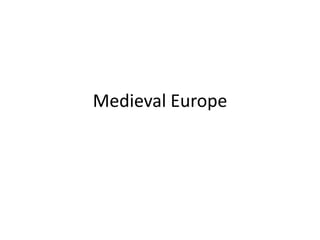
Ch 5 sec 1
- 2. Vocabulary • Feudalism • Manor • Heresy • Town charter • Magna Carta • Power of the purse • vernacular
- 3. European Kingdoms • German tribes migrated into Roman Empire • As the Roman Empire weakened, the German tribes increased in power. • These German tribes became the foundation of Medieval Europe
- 4. Merovingian House • Clovis was the leader • Cried out to God during a battle for victory and promised to be baptized if he won • He ordered 3000 of his soldiers to be baptized • It was divided between his four sons when he died
- 8. • This house lost influence due to careless and immoral living • The Mayor of the palace became the real power in the kingdom (leading palace official)
- 9. Carolingian House • Pepin II was mayor of the palace • Charles Martel was his son and he expanded the kingdom • Pepin the Short was Charles’ son and he received permission from the pope to take the title of King.
- 11. • When Pepin the Short died, his sons Carloman and Charles ruled together • Carloman died and Charles was the sole ruler • Had title of Charlemagne which means “Charles the Great”
- 13. • Pope placed a crown on Charlemagne’s head and proclaimed him Roman emperor • Later popes would point to this event and claim authority over kings
- 15. Pepin II Mayor of the Palace Charles Martel The Hammer Pepin the Short Received title of King Carloman Charles died Charlemagne
- 16. Under Charlemagne • Education was important – His court was a place of learning and scholarship – Monasteries became centers of Western knowledge
- 17. Feudalism • When Charlemagne died, Europe was divided among his sons. • It resulted in a division of Europe and a lack of strong leadership • This all led to the rise of feudalism • Feudalism: A system whereby European land was subdivided from king to nobles and then to serfs in exchange for loyalty and allegiance
- 20. Life on a manor • The estate on which most people lived was called the manor • Few could read and so had to listen to priests • Often what was taught in word and picture was very different from what is found in the bible
- 21. Papal Power • Gradually the Roman Church became a powerful member of medieval society • Leo I was the first pope • They continued to gradually gain more power • Pope Innocent III claimed to have supreme authority over all
- 23. Problems with the Roman Church 1. Pastors were forbidden to marry and this went against the Creation Mandate 2. Believed the bread and wine changed into the body and blood of Christ during mass 3. Heresy was punishable by torture or death Heresy: (false teaching)
- 24. The Sacraments of the Roman Church 1. Baptism (to remove original sin) 2. Confirmation (to receive the Holy Spirit) 3. Confession (to receive forgiveness from a priest) 4. Communion (primary sacrament to receive redemption from sin) 5. Matrimony (controlled by the church) 6. Holy Orders 7. Last Rites (anointing of sick prepares one for death)
- 25. Christianity in Medieval Europe • Many people were baptized into a form of Christianity that imitated their pagan worship • Medieval Christianity was very different from biblical Christianity • People were ignorant of the Bible’s most basic teachings • The Bible was accepted as God’s word
Hinweis der Redaktion
- Christianity thrived and spread throughout the German tribes…the Roman government collapsed…
- Clovis used military force and other means to combine several kingdoms…The soldiers were baptized into the Roman church…this alliance between the Frankish rulers and the Church of Rome endured for centuries.
- Charlemagne demonstrated strong leadership…defeated many other tribes in Europe…his government worked to ensure justice and maintain peace throughout his kingdom…Christmas day 800…This raises an important question: who is supreme---the state or the church?
- He encouraged the education of the clergy and children of nobility…his reforms stirred an interest in the Bible and writings of classical authorsMonks taught people to read and writeHe encouraged the discovery and copying of many ancient worksThey preserved Christian learning by storing and copying documents…European culture and civilization would be built upon this preserved knowledge.
- Lack of central power led to the rise of feudalismServants were loyal to the nobles and submitted to his authority…in fact, many were little more than slaves
- Kings often had very little real power…king needed support of his nobles…he depended on them for financial and military support
- The manor was largely self-supporting…had own black smith, a mill to process grain and skilled laborers, a church, priest…
- Pope Leo I convinced the Huns not to destroy the city of Rome and he was made popePope Innocent enforced absolute authority over clergy and kingsHe sent armies and issued papal decrees to force rulers and nation-states to submit to his will
- By not marrying, they were loyal to the popeIf you believed other than the bread and wine becoming the body and blood of christ, you committed heresy
- Holy orders – priest is another Christ; the nun is considered the bride of Christ
- Rulers found an alliance with Rome useful…The influence of Christianity in the culture paved the way for the Reformation, in which the fullness of the gospel was once again widely proclaimed.